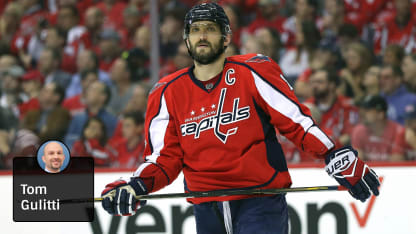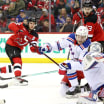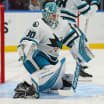ARLINGTON, Va. -- What's next for Alex Ovechkin and the Washington Capitals is difficult to answer.
Ovechkin will turn 32 on Sept. 17, and the reality that he's nearing the end of his prime without a Stanley Cup championship and his role is changing is setting in.
Alex Ovechkin concedes he must make changes for Capitals
After playoff disappointment, could have new role, routine

The Capitals lost 2-0 to the Pittsburgh Penguins in Game 7 of the Eastern Conference Second Round on Wednesday. It's the second straight season the Capitals won the Presidents' Trophy as the best regular-season team in the NHL but lost to the Penguins in the second round. Washington hasn't gotten past the second round since 1998.
RELATED: [Capitals window to win Cup 'not there anymore' | Oshie, Shattenkirk have different free-agent plans]
After having his ice time reduced during the regular season, Ovechkin was dropped to the third line for the last three games of the series against the Penguins after the Capitals lost three of the first four. He confirmed Friday that he played with knee and hamstring injuries during the playoffs but said the move was unrelated to the injuries. The hamstring injury occurred near the end of Game 3 against Pittsburgh; he had one point in the last four games (a goal in Game 5) after getting four (one goal, three assists) in the first three.
"You take the change in the lineup. It's all to get the result," Ovechkin said. "It's all to bounce back, to bring energy, bring Game 7 to Washington, and it worked. I think all four lines played well, but in Game 7 we just didn't get it done."
Coach Barry Trotz described the demotion as a lineup tweak for the series against the Penguins and said he expects Ovechkin to be back in his usual top-six role next season.
"He's a prominent, big-time player, no question," Trotz said. "I think [his role will be] probably very similar to last year. He's been in the top six, top three really, through his whole career."
Ovechkin finished the Stanley Cup Playoffs with eight points (five goals, three assists) in 13 games. In 82 regular-season games, Ovechkin had 69 points (33 goals, 36 assists). The 33 goals were his fewest in a full season since he scored 32 in 2010-11, but his 36 assists were the most since he had 53 in 2010-11.
"He's still got game. No question," Trotz said. "He's still a pretty productive player for us."
But to keep Ovechkin fresh during the regular season, Trotz cut his ice time from 20:18 per game last season to an NHL career-low 18:21. In the playoffs, Ovechkin played 19:29 per game, but there were some nights when Trotz used him less. Ovechkin's 15:09 in even-strength ice time in Game 7 on Wednesday ranked seventh among Capitals forwards.
Ovechkin conceded that he'll need to make changes as he gets older.
"I don't want to stay on the same level," he said. "I want to be better. I want to get better and I have to work much harder this offseason than those previous to get success and to get the goal of the Stanley Cup."
Trotz said he shared with Ovechkin what some older players told him about how they were able to keep playing well in the latter part of their career. He mentioned San Jose Sharks center Joe Thornton, who will turn 38 on July 2.
"Joe Thornton said to me, 'I'm like an old truck. Once the battery stops, you might not start it again,'" Trotz said. "I just think as you get older, you have to be much more conscious to what you eat, how you train, how much you train and why you do it so that you're very specific, and you have to be a lot more disciplined because the body just doesn't come off like it used to. You have to work harder at it."
That's the commitment Ovechkin will have to make in the offseason. Whatever direction the Capitals choose after their latest playoff disappointment, he's probably going to be part of it.
Ovechkin has four more seasons left on his contract, which has a limited no-trade clause and an annual NHL salary-cap charge of $9.5 million, according to CapFriendly.com. If the Capitals want a different ending to their season, they'll need Ovechkin to be better.
"You play 82 games, work hard in the offseason and in the summer, you want to play in the playoffs," he said. "You don't play 82 games to play four games or seven games [in the playoffs], and then go back to vacation and stuff like that. You want to play still."

















